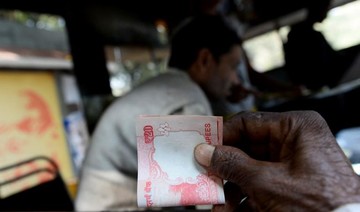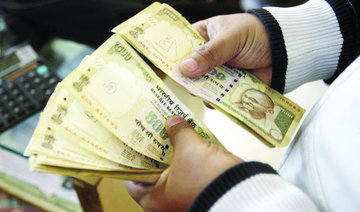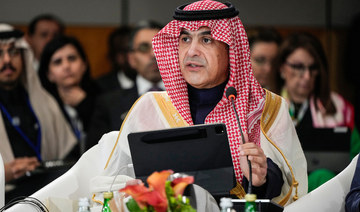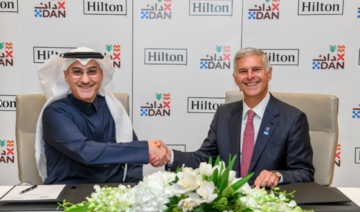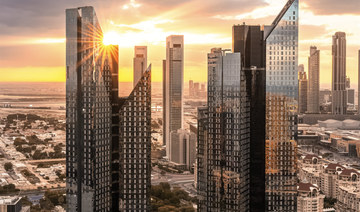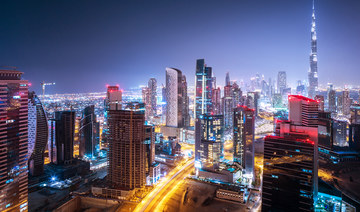MUMBAI: The Indian rupee breached the 72 to the dollar mark for the first time on Thursday, extending losses as a rout in emerging markets kept investors on edge.
The rupee fell to a record low of 72.11 to the dollar at one point, but pared the day’s losses after mild selling of dollars likely by the Reserve Bank of India, dealers said.
At 0829 GMT, the rupee was trading at 71.9350 to the dollar compared with its previous close of 71.7750.
“This is not intervention, it is just mild selling (of dollars) to smoothen out the volatility and not to protect any level anymore,” said a senior forex analyst at a state-run bank.
The rupee has fallen nearly 2 percent this month and more than 12 percent this year, making it Asia’s worst performing currency.
Dealers estimate the RBI on Thursday to have sold about $1 billion, which they said is not much given the pace of the rupee’s fall.
The RBI anonymously intervenes in the forex market through banks, and publishes its forex reserves numbers with a week’s time lag. Typically, traders can only estimate the intervention number from the weekly data.
While the sharp fall in the rupee and the RBI’s light-handed approach in the forex market have surprised several traders, government officials have not shown much concern about the currency’s rapid depreciation.
Finance Minister Arun Jaitley said late on Wednesday there was no need for a panicked reaction to the rupee’s fall while the commerce secretary, Anup Wadhawan, said the slide was due to global developments and was helping India’s exports, which rose 14.32 percent in July to $25.77 billion from a year earlier.
“It is quite puzzling to the markets what the government and RBI want on the rupee, and why the government is sending out such signals that they are not worried about the rupee,” said a forex trader at a state-run bank.
The next Fibonacci technical level for the rupee will be 72.50-72.80 to the dollar, the forex analyst said.
Indian rupee breaches 72 to the dollar to hit new low
Indian rupee breaches 72 to the dollar to hit new low
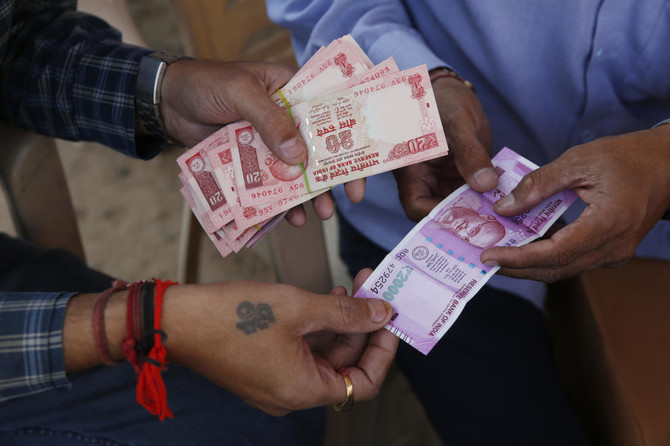
SFD, AfDB sign deal to finance development initiatives in Africa
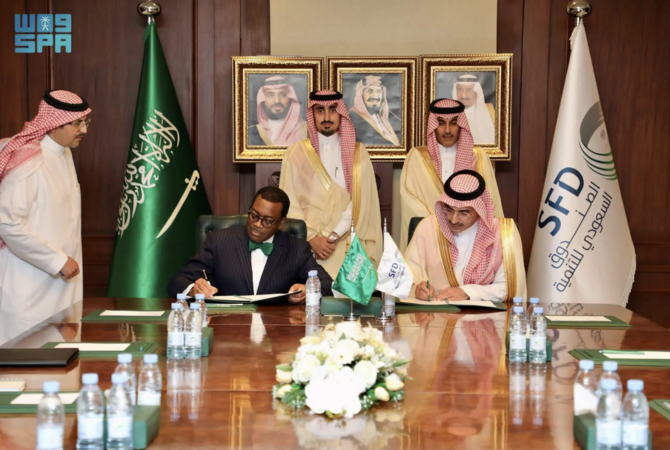
RIYADH: Developing African countries are poised to receive a funding boost for growth initiatives following a deal with the Saudi Fund for Development, aiming to foster sustainable progress.
The memorandum of understanding, signed with the African Development Bank Group, aims to promote mutual objectives and activities for sustainable international development between the two parties, the Saudi Press Agency reported.
This initiative aligns with SFD’s objective to enhance both social and economic growth by creating diverse opportunities.
Moreover, the newly signed agreement aims to facilitate the exchange of knowledge and experiences while advocating for optimal co-financing strategies. It will also support the attainment of sustainable development goals and optimize the impact of these initiatives.
Additionally, the MoU also aims to enhance collaboration in pursuit of shared goals that promote the expansion of crucial opportunities in diverse beneficiary African nations, ultimately contributing to global prosperity for the most impoverished and least developed communities.
Saudi Central Bank and BIS co-host meeting on reserve management in Riyadh
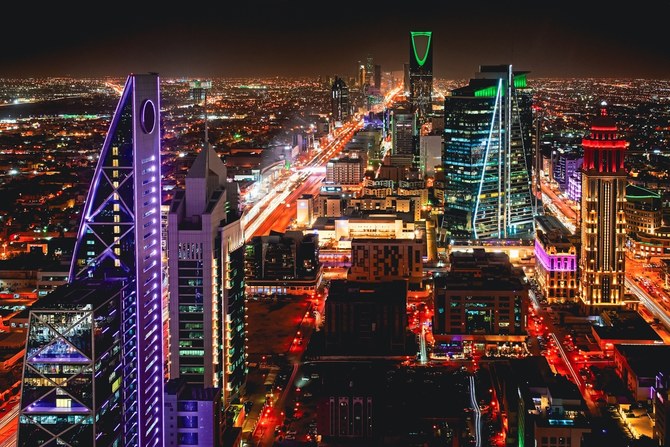
RIYADH: The evolving global landscape presents new challenges and opportunities for central bank reserve managers, the governor of Saudi Arabia’s apex financial institution explained at a high-level meeting.
Speaking at an event in Riyadh which was attended by the Bank for International Settlements, Ayman Al-Sayari set out his view on the complexities of the current macro-financial environment.
The two-day gathering, which began on April 28, brought together reserve managers and experts from central banks in the Middle East and North Africa region, as well as participants from other apex financial institutions, to discuss the latest trends in managing foreign exchange reserves.
The event served as a platform for participants to exchange insights, perspectives and expertise on the most critical aspects of reserve management through a series of panel discussions and keynote speeches.
In March, SAMA’s monthly statistics bulletin revealed that foreign assets of Saudi Arabia’s commercial banks surged by 22 percent in February, reaching a total of SR347.63 billion ($92.7 billion) compared to the same month of the previous year.
This rise reflects a significant expansion in the commercial institutions’ international holdings and investments.
The central bank added that its net foreign assets reached SR1.55 trillion in February.
Central banks’ foreign holdings are primarily for reserve management and monetary policy purposes, while commercial banks’ foreign assets are for business operations, customer services, and investment activities.
The report added that Saudi Arabia’s total reserve holdings amounted to SR1.62 trillion, representing a five percent decline compared to the same month of 2023.
Hilton plans to quadruple its Saudi footprint, says top executive
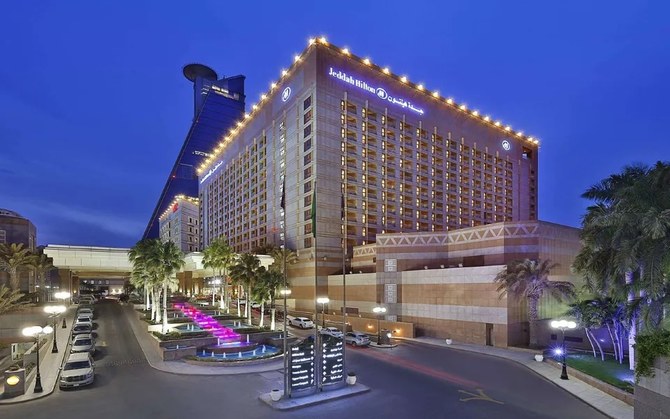
RIYADH: Saudi Arabia’s hospitality sector is growing by leaps and bounds with key global players entering the scene due to the business-friendly policies of the Kingdom announced as part of its economic diversification efforts.
Hospitality giant Hilton has announced plans to develop two hotels in Jeddah and Abha. According to a press statement, Hampton by Hilton Al Nuzhah in Jeddah will be developed in partnership with Al Manar United for Trading. Scheduled for opening in 2026, the hotel will feature 80 rooms.
The Hilton Garden Inn located in Abha is expected to open in 2027, it said.
The Abha hotel, also developed in partnership with Al Manar United for Trading will have 200 rooms, a lounge, a dining area, and a rooftop, as well as a gym and an outdoor pool.
Speaking to Arab News on the sidelines of the Future Hospitality Summit in Riyadh on Monday, Guy Hutchinson, president of Hilton in the Middle East and Africa region, said that the company plans to more than quadruple its Saudi footprint and open more than 60 hotels, with plans to exceed 100 properties in the coming years.
“As Saudi Arabia sets its target to increase hotel rooms to 550,000 by 2030, our pipeline of hotels will add more than 17,000 rooms in the coming years and we will introduce new brands to emerging and established destinations in Saudi Arabia,” said Hutchinson.
He added: “From focused service and branded residences to lifestyle and luxury, two-thirds of our pipeline is currently under construction and we remain committed to diversifying our portfolio to cater to diverse traveler needs.”
In partnership with master developer Knowledge Economic City, Hilton also signed an agreement for Hilton Residences Madinah Knowledge Economic City adjacent to Hilton Madinah Knowledge Economic City which is currently under construction.
The project in Madinah — set to open in 2026 — is expected to feature 64 two, three, and four-bedroom apartments.
“We are delighted to be working with master developer Knowledge Economic City to grow our footprint in Madinah. Knowledge Economic City is a very important project, playing a significant role in growing the city’s supply of modern and lifestyle destinations,” said Hutchinson.

He added: “We currently have Hilton Madinah Knowledge Economic City under construction, and the branded residences will provide guests with various choices of apartments and access to the hotel’s wide range of amenities, further contributing to destination accommodation offering.”
The press statement also added that Hilton Riyadh Olaya is expected to open its doors to guests in the coming months.
Carlos Khneisser, vice president, of development, Middle East and Africa at Hilton, said these new agreements will help meet the rising demand from travelers to Saudi Arabia as the Kingdom targets 150 million visitors by 2030.
“Saudi Arabia’s tourism landscape continues to evolve rapidly, presenting significant growth opportunities for Hilton and our valued partners. Two-thirds of our Saudi pipeline is currently under construction and we are working closely with investors to expand into new destinations with more of our brands,” said Khneisser.
During the talk, Hutchinson said that Hilton is committed to creating 15,000 jobs in the Kingdom by 2030, with more than half of the recruits being local talents.
“Our pipeline of hotels will create 15,000 job opportunities, with more than half of these recruits anticipated to be Saudi nationals. Over the past two years, Hilton’s portfolio of hotels across Saudi Arabia have welcomed more than 250 trainees through their doors, of which more than 200 are women,” added Hutchinson.
DIFC records $2.6bn in gross written premiums, highest figure in its 20-year history
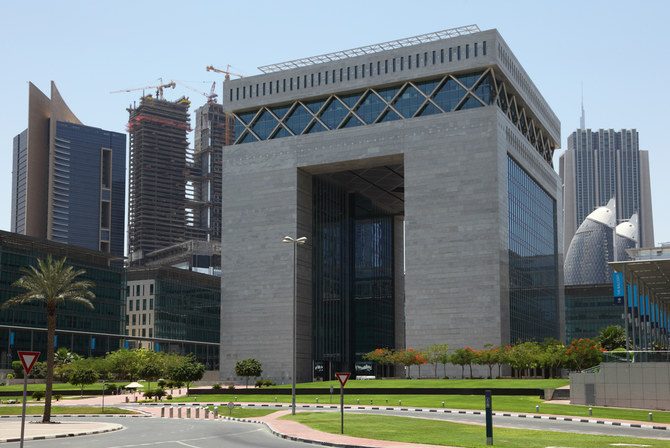
RIYADH: Dubai International Financial Centre recorded its highest gross written premiums in its 20-year history, amounting to $2.6 billion in 2023, marking a 23 percent increase from the previous year.
DIFC, a global financial center in the Middle East, Africa, and South Asia region, connects the fast-growing markets of the region with global economies and offers dining, retail, and living amenities, according to its website.
The center also recorded a 20 percent increase in the registration of insurance and reinsurance firms, including the first move of a Guernsey-based captive.
The Emirates News Agency reported that DIFC “has consolidated its position as the principal hub for the (re)insurance industry,” adding that DIFC’s appeal for managing general agents, representing 43 percent of new registrations, is a major factor shaping its insurance landscape.
This is credited to the center’s well-established regulatory framework, facilitating partnerships with cedants and brokers.
The influx of global insurers, reinsurers, and brokers, as well as captives, MGAs, and other industry stakeholders into DIFC, is driven by several factors. These include buoyant oil prices and increased infrastructure spending, as well as a focus on sustainable projects and low insurance penetration in the region.
Among the notable entities to join DIFC’s insurance sector in the past year are Alif Limited, Arc Insurance and Reinsurance Limited, and Barents Risk Management Limited. Joining them are BharatRe Global Ltd. and many more, it added.
Arif Amiri, CEO of DIFC Authority, emphasized the center’s role as a global industry hub, hosting over 120 registered insurers, reinsurers, captives, MGAs, and related entities.
The significance of DIFC’s stature in the insurance domain is further underscored by its co-hosting of the Dubai World Insurance Congress, featuring discussions on key themes reshaping the industry’s future, including innovation, capital attraction, and talent development.
In 2023, a survey conducted at DWIC revealed an 87 percent confidence in the Middle East, Africa, and Southern Asia market’s strategic opportunities. Property, health, energy, cyber, and liability lines of business were identified as holding the most potential. The survey also highlighted an 85 percent confidence rate in renewals and client retention.
Over two decades, DIFC has fostered the growth of the insurance and reinsurance industry, attracting talent and expertise to access key markets in the Middle East, Asia, and Africa.
The center hosts major insurance brokers, five of which are top ranked by the specialized insurance credit rating agency, AM Best. This has contributed to a significant 61 percent increase in brokered premiums compared to 2022, surpassing the $2 billion mark and solidifying DIFC’s position as a global market for insurance and reinsurance placements.
Dubai Real Estate Brokers Program attracts 25 strategic partnerships
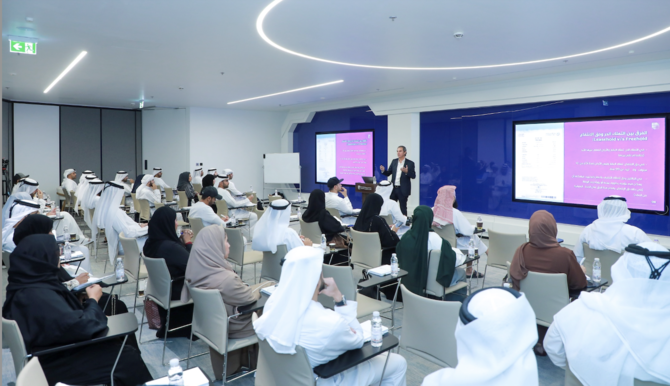
RIYADH: Dubai’s property market is set to grow, with the Real Estate Brokers Program securing 25 partnerships with brokerage companies and developers in the private sector.
According to a press statement, the first phase of the program, launched in mid-March and headed by the Dubai Land Department, also received over 1,000 registrations from Emirati citizens.
Dubai Real Estate Brokers Program aims to increase the proportion of citizen brokers from 5 percent to 15 percent over the next three years to enhance the participation of young citizens in the Emirate’s developmental initiatives across various key sectors.
“This reflects the early positive impact of the program, showcasing citizens’ aspirations and eagerness to engage as real estate brokers and acknowledging the pivotal role of Dubai’s real estate sector locally and globally,” said Marwan bin Ghalita, acting director general of Dubai Land Department.
The initiative also aligns with Dubai Social Agenda 33, which seeks to triple the number of Emiratis working in the private sector.
Ghalita added that the program will help young talents in the nation enhance their productivity, therefore contributing to Dubai’s economic growth.
“Dubai consistently offers outstanding examples of collaboration and synergy between the private and public sectors,” said Ghalita.
He added: “With the program’s enrollment exceeding 1,000 citizens and real estate companies continuing to join the strategic alliance within a short period, we are diligently working toward achieving all the ambitious goals of the Dubai Real Estate Brokers Programme. In particular, Emirati real estate brokers will increase from 5 percent to 15 percent over the next three years.”
The program also encompasses additional initiatives, including Emirati real estate broker licensing, encouraging property developers to allocate a portion of their sales to local agents, and empowering citizens in the property sector.
Under the partnership with the private sector, citizen participants will receive various support packages to enhance the competitive edge of UAE people and enable them to take up roles in the real estate sector.
The press statement added that efforts would also be made to allocate 10 percent to 15 percent of the development company’s sales to be marketed by Emirati real estate brokers, therefore contributing to the empowerment of national citizens by offering them employment opportunities in the property market.


